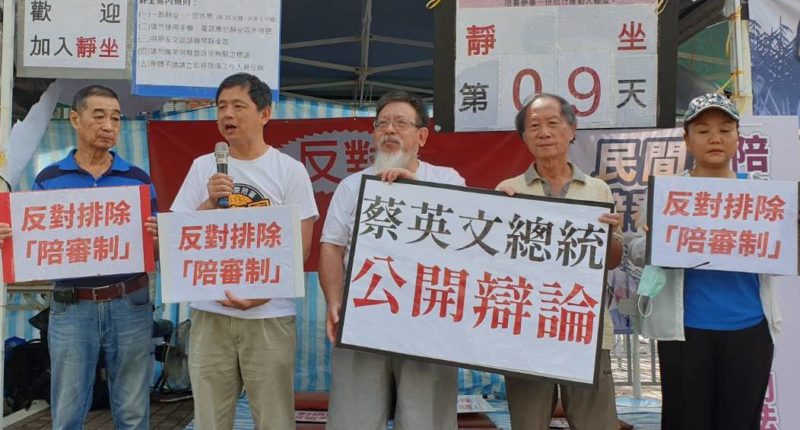In both her inauguration addresses, President Tsai reaffirmed the importance of judicial reform.
She is hardly mistaken.
As of 2019, only 31.4 percent of the public believe that judges rule justly – a troublingly low number for a country that prides itself on having rule of law.
One reason for the low level of satisfaction with court rulings is the widespread belief that justice only serves the court elite, rather than the interests of the general public.
Accordingly, there has been a growing discussion surrounding reforms that would allow citizens to participate in court decisions as a way to balance the exclusive rights of judges.
Yet, Tsai’s promise for judicial reform failed to materialize when the Judicial Yuan announced in April that it would only consider the introduction of a lay judge system, reneging on a joint agreement with non-governmental organizations that it would run a six-year parallel trial consisting of both a lay judge system and a jury system.
An alliance led by the Judicial Reform Foundation (JRF) and the Taiwan Jury Association characterized the Judicial Yuan’s lay judge system as “fake reform”.
Under such a model, six citizen judges would work alongside three court judges to reach a majority decision on a verdict and sentencing, but critics say the lay judge system does not allow citizens to participate meaningfully in the judicial process.
Test trials have shown that professional judges have a propensity to leverage their experience and legal expertise to preside over the deliberation process, retaining real authority and decision-making power.

By contrast, juries aim to restore public trust in the judicial system by delivering rulings informed by the collective wisdom of twelve jury members from different walks of life.
Jurors are randomly chosen and would vote unanimously to reach a verdict on questions of fact, and judges would later enter a judgement based on the findings of the jury.
Since it is not easy for twelve people to totally agree on one matter, the unanimity required by the jury system forces jurors into a more extensive and careful deliberation process that prevents miscarriages of justice and is more democratic.
However, top judicial authorities and DPP legislators have taken a clear stance against the implementation of a jury system.
In their view, the system of lay participation not only avoids deadlocked juries, which can overly lengthen the trial process, but is also a better fit for Taiwan’s current legal atmosphere given that most citizens do not fully understand the proceedings of a jury trial.
In response, both the JRF and the Taiwan Jury Association blasted the government for its condescending attitude.
Whereas it is true that supplementary measures need to be implemented to support the introduction of a jury system, such is true for all reforms.
Moreover, it is precisely the mixture of different life experiences and professional expertise that makes juries desirable in the first place.
Taking into consideration the back and forth between the government and the NGO alliance, it is important to recognize that there is no perfect system for law and justice.
Both the lay judge system and the jury system have merits and demerits, and this is perhaps the best reason for running a parallel test trial – to give the public a chance to see for themselves which system is best for them.
After all, judicial reform is a question of whether or not society at large believes the public’s collective wisdom can be channeled to conduct democratic, fair, and impartial trials.










Comments are closed.